- Home
- Peter Swanson
Her Every Fear Page 14
Her Every Fear Read online
Page 14
How had Henry even known about Rachael, about Corbin’s relationship with her? Had he been up in New Essex watching Corbin in August? The thought terrified him. He googled Henry Wood and found nothing. The most recent mention he was able to locate was some cross-country track times when Henry had been at Aurelius. He tried Hank Bowman, the name that Henry had used when he’d been dating Linda Alcheri, and found nothing under that name either. He considered, for the first time ever, going to the police and confessing everything, showing them the Polaroid he still had of Henry standing over the body of Claire Brennan in the London graveyard. But what would happen to him? Even if he lied and said he’d only ever been an accomplice in the murders, he’d still go to jail for a long time. He’d still become a public figure, known for his atrocities, and also for his cowardice.
No, he could never confess. Corbin realized that Henry, by killing Rachael Chess, by making himself known to Corbin, had trapped him. He was being watched and he couldn’t see his watcher. He felt a hatred toward Henry deeper than any hatred he’d felt before. Corbin decided on the only option he felt was available to him. He would lay low, and he would never become involved with a woman again. If Henry Wood ever showed himself, or if Corbin was ever able to track him down, he would kill him himself. He’d done it before and he could do it again.
Chapter 17
Soon after the death of Rachael Chess, Audrey Marshall moved into a vacant apartment on Corbin’s hall. 101 Bury Street was mostly occupied by older couples, and it was a shock when he first saw Audrey carrying boxes into Apartment 3C. She was not the type of woman he was naturally attracted to; she was a wispy blonde, fragile looking, with milk-white skin, but seeing her wrestle with her door, her thin arms straining to hold on to the box, Corbin felt a jolt of longing. He offered to carry up some of her things from the moving van parked on the street, and to his surprise she’d happily accepted. It was box after box of books. She told him she’d been working as a literary agent in New York, but had moved to start a job in editing at Boston’s biggest publishing house. After emptying the van, she’d said: “Now I owe you. As soon as I get settled let me make you dinner. I can’t wait to use the kitchen in this place.”
“You don’t owe me anything,” Corbin had said, and returned to his own apartment. He hoped that his coldness would eliminate any further contact.
It did, for a time. He passed Audrey in the hall and in the courtyard, and they were always civil, if not overly friendly. Whenever he saw her, she was alone, usually carrying a manuscript or a book. He began to imagine her life, alone in a new city, and felt a little bad for his aloof behavior on the day she’d moved in.
The second winter after Audrey’s arrival was one of the worst in Boston’s history, snow piling up and day after day of subzero temperatures. The largest of the storms began on a Thursday night in January and paralyzed the city all through the weekend plus most of Monday. It was during that weekend that Audrey, after saying hello to Corbin in the front lobby, showed up twenty minutes later at his door.
“I’m so stir crazy that I made enough chili to feed the entire building. Please come over and have some.”
“I . . .”
“I’m not taking no for an answer—unless you have other plans—and I’m not hitting on you, I promise. You don’t have to stay long.”
Corbin agreed to come over at six. He found a good bottle of red wine and changed out of his workout clothes into jeans and a flannel shirt. He knocked on Audrey’s door at five minutes past six and she let him into her place, considerably smaller than Corbin’s massive end apartment. NPR was playing through her speakers, and Corbin wondered if that was a deliberate choice, so that their eating dinner together would seem less romantic. If it was, it backfired. Something about Audrey tending to the chili while Corbin made a salad, the news of the day prattling on in the background, made them seem like an instant couple, comfortable with each other and comfortable in their own skins. Corbin stayed till midnight. They finished his wine and drank another bottle that belonged to Audrey. She admitted that she’d been lonely in Boston, but not unhappy. He told her that he loved his solitary lifestyle. Back in his apartment, while brushing his teeth, Corbin felt a sharp pain in his chest. He thought it was heartburn and pressed a hand against his pectorals. To his shame, tears filled his eyes. The night with Audrey had made him realize how lonely he’d become.
They didn’t see each other for over a week, not till Corbin was opening his door to let Sanders, who’d been scratching for at least ten minutes, into his apartment. Audrey was walking down the hall, stripping off a long, padded jacket that was damp with the latest snowfall.
“Hey, stranger,” she said.
He’d invited her in, since she hadn’t seen his apartment yet, and they ended up drinking wine and ordering a pizza.
“I like you,” she said to him at the end of the night. “Even though I can’t read you at all. You’re a complete mystery.”
“I’m not, really,” Corbin said.
“No, you are. Are you going to kiss me?”
He did, and Audrey stayed the night. After she fell asleep, Corbin went to the bathroom on the distant side of the apartment, sat on the toilet lid, and cried again; his chest felt like there was a knife in it. Several knives.
“Do you mind if we talk a little bit?” Corbin asked Audrey as she was getting dressed the next morning. He hadn’t slept at all.
“That was soon,” she said. “You have a girlfriend? You’re gay? You just got out of a really damaging relationship?”
“None of those,” Corbin said. “But I have a strange request, and I will completely understand if you want nothing to do with me after I request it.”
“Okay,” she said, her voice wary. Audrey stood in just her jeans and a thin pink bra that she hadn’t clipped at the back yet. Corbin noticed the faint scar from an appendectomy above her right hip.
“I’d really like to continue seeing you, but I think we should only see each here in this apartment building. At my place or your place, but not in public. I know that sounds horrible, but I have a reason, and it’s a reason I can’t tell you.”
“Obviously, you have a girlfriend,” Audrey said.
“I don’t. I know you won’t believe me, but I really don’t. It’s something else that I can’t tell you about it. The closest I can say is that I’ve had girlfriends in the past and things went wrong, and I swore I wouldn’t become romantically involved again. But this feels right, but only if it’s here, just here, in this building.”
She hooked her bra and took a deep breath. “Okay,” she said. “I guess it’s convenient.” She laughed, but Corbin thought it seemed a little forced.
The arrangement actually worked for a while. Most of the time Corbin would go to Audrey’s apartment. He’d bring wine, and they’d watch a movie on television, or they’d cook together. There were so many elements of Audrey that attracted him. She was matter-of-fact, not duplicitous at all, always telling him how she felt. In the bedroom she was responsive but not overly eager. She never said dirty things, and she preferred the lights off, like he did. Periodically, however, she would bring up the arrangement. Sometimes as a joke: “So which one of us is going to walk down to the 7-Eleven for ice cream, since we can’t walk together?” Sometimes not: “My sister is coming to visit, and it’s ridiculous that I can’t introduce you to her. You realize that?”
Corbin always responded the same way. He said that it was unconditional that they never be seen in public together, and that it had everything to do with him and nothing to do with her. But every time he was forced to say those words to Audrey, his anger and resentment at Henry grew. Henry had made Corbin a murderer, and as though that weren’t enough, he was now out to destroy Corbin’s life, to destroy any possibility of happiness. Because why? Because they were no longer friends?
In his spare time, Corbin hunted for Henry Wood across the Internet, even contacting some fellow classmates from the semester in London to see
if any of them knew what had happened to Henry. One of them said he’d run into him in New York City, but that was two years ago. The thought of finding Henry, and making him pay for what he’d done, consumed Corbin, especially now that he was with Audrey. If Henry were dead, then he could be with her without the constant fear of being seen together. And that was what it was: a constant fear. As much as he wanted to be with Audrey, he wondered all the time if he would come home some day to find out she’d been killed, that Henry, the invisible monster, had found out about them and made Audrey pay for it with her life. It was nonstop paranoia.
The worst moment came when Corbin was having drinks with the only other young resident of the building, a guy named Alan Cherney with whom he’d played racquetball a few times. Alan point-blank asked him if he was seeing Audrey—he’d heard rumors, he said, although he didn’t say where he’d heard those rumors from. Corbin had played it cool, but the conversation kept replaying in his head over the next twenty-four hours. If Alan knew they were seeing each other, then other people could know. And if other people knew, then Henry, wherever he might be, might know, and he would come for Audrey the way he had come for Rachael Chess.
Even though they didn’t have plans, Corbin barged in on Audrey the following night and accused her of letting someone in the building know about their relationship.
Audrey’s eyes went large in disbelief. “Jesus, Corbin,” she said, shaking her head.
“It’s not funny. I was out having a drink with a guy from across the way and he asked me about the two of us. He knew.”
“So what?”
Corbin made himself wait two seconds while he unclenched his jaw. “I know that you don’t care because I haven’t told you my reasons, but you do know how important it is to me that no one knows we’re together. Don’t pretend it’s no big deal.”
“No, trust me. I know it’s a big deal. What do you want me to say? I haven’t told anyone. We don’t go out in public together, so I have no idea how he knows about us.”
“Well, he knew.”
“Who is he? Do I know him?”
“Alan something. He lives on the other side of the building.”
Audrey looked out her window. “He lives across from me. I’ve seen into his apartment. He’s probably seen into here, and seen you. That’s all.”
Corbin looked through Audrey’s living room window and across at the dark windows on the other side of the courtyard. “You think?” he said.
Audrey smiled, for the first time since Corbin had entered her apartment. It wasn’t much of a smile, but it was a smile. “Yeah. What else could it be? He probably watches me and he’s seen you come over. Big deal.”
“You don’t care that he’s watching you?”
“I don’t know. Maybe it’s exciting. Maybe I should be going out with him instead of you.” She was still smiling. Corbin went and pulled the curtain across Audrey’s window.
That night, that conversation, was the beginning of the end.
It wasn’t surprising to Corbin. He knew it was never going to last. They spent a few more nights together, but Audrey kept pressing him about his reasons for keeping the relationship private. He couldn’t answer her, except to say, “It’s to keep you safe, you have to believe me on that.”
“Do you have any idea how creepy that sounds?” she said.
When it was officially over, Corbin, in a way, was relieved. He went back to a solitary existence, working long hours, going to the gym every day, but at least it was an existence in which Audrey wouldn’t be hurt. He occasionally fantasized about opening a newspaper and seeing an obituary for Henry Wood. He pictured himself finding Audrey on the street in broad daylight and kissing her there in front of everyone. It would be like one of those films he hated, but he wouldn’t care. He couldn’t get the image out of his mind.
When the opportunity to transfer to London came up, he jumped at it. Six months away from Bury Street, from living next to Audrey, would be good for him, and good for Audrey, as well. It made him nervous to return to the city where he had fallen in love with Claire Brennan and first encountered Henry Wood, but it was also the city his father was from. Maybe he’d reconnect with that side of his family. He remembered the pictures his father had shown him from that trip he took to England the year before he died. There’d been several of his cousin Lucy and her husband and daughter. Something had happened to that daughter since those pictures had been taken; she’d been stalked and nearly killed by an ex-boyfriend. At least that’s what Corbin’s mother had told him, although how she found out he didn’t know. Corbin wrote to his father’s cousin, Lucy, and told her he was probably coming to London, and said that maybe they could meet. She was the one who suggested a possible switch of apartments with Kate. She said that an adventure would do her daughter good. It had all been arranged so easily. The thought of Kate moving into his place made Corbin somehow feel comforted. Maybe she’d become friends with Audrey and report back. It would be a connection, even the tiniest one.
For his first full day in Kate’s cozy flat, Corbin only left once, walking to the nearest grocer for food and bottled water and wine. During this excursion, he was enormously relieved to not run into his new upstairs neighbor Martha. It had been a mistake getting drunk and making out with her the night before. She’d be hard to avoid but not impossible.
The rain came and went all day, battering at the large bay windows at the front of Kate’s flat. He watched English television while doing push-ups and squats, then cooked the chicken breasts he’d bought. He checked his e-mails. Audrey still hadn’t responded to the last one he’d sent her, the one in which he said he hoped things were easier now that he was out of the country, and he hoped she met someone who was worthy of her. He wrote an e-mail back to Kate thanking her for recommending the pub down the street, and he even mentioned meeting Martha, curious to see if she’d have anything to say about her. Martha had claimed that Kate and she were best friends, but somehow Corbin doubted it.
By Sunday afternoon he still hadn’t heard back from Kate in Boston. For some reason it worried him. He took a long run, even though it was still raining, and wound up at a park called Primrose Hill with a hazy, distant view of central London. The wet soil in the park sucked at his running shoes, and he thought of that day in the cemetery with Henry, digging a grave. He ran home, showered, then checked his e-mails again.
Still nothing from Kate, but someone named Roberta James from the Boston Police Department had written to inform him that his neighbor Audrey Marshall had been found dead under suspicious circumstances, and would he get in touch with them as soon as possible.
Chapter 18
Kate sat up so fast that Sanders, startled, bolted from the room.
How did he get back in? She’d let him out, hadn’t she? Her mind scrambled to remember. She’d opened the door for him after he’d meowed at her. She’d watched him leave, hadn’t she? But then she remembered that she’d looked for him through the peephole and she hadn’t seen him in the hallway. She thought it had been strange at the time, but had just assumed that Sanders had raced down the hallway and out of sight before she’d had time to see him. But maybe he’d never left at all. Maybe that was it. That possibility allowed her to breathe, pulling in several lung-filling intakes of breath.
She stood, walked on tingling legs to the den door, and switched on the recessed lighting that ran along the shelves and cabinets. “Hello, there!” she shouted, trying to make her voice sound rational. She’d still look around the place, make sure no one had opened a door, make sure that no one was inside the apartment. Just in case. She told herself that Sanders must have not actually left.
No, he left. You saw him. It was George’s voice in her head. He giggled. It was something the George inside of her sometimes did, even though the real George, the dead George, had never giggled.
I didn’t see him, she told George’s voice. I just opened the door and thought that he brushed past my leg on the way out. I was w
rong.
She stepped from the den into the hallway and walked toward the living room, turning on lights as she went. Sanders stood at the front door again, staring at it, as though it might magically open of its own volition.
“Sneaky kitty,” Kate said to Sanders as she walked toward him. “I thought you’d left.”
He meowed back at her, and Kate cracked the door open, watching as he left this time, his tail twitching. She locked the door behind her and pressed her back to it, looking at the living room, trying to sense whether someone was in the apartment. No, she told herself. I’m alone. Sanders must have been here all along. Still, she walked across the living room to the fireplace, its grate stacked with real wood, and picked up the fire iron that leaned against its brick exterior. She immediately felt better with its weight in her hand. Moving swiftly, she searched the apartment, turning on every light she could find and peering into every room. The place was empty, as far as she could tell. The front door was locked, and so was the door in the kitchen that led to the back stairwell.
She returned the fire iron to its place. Her hand was sweaty where she’d gripped it, and there was a faint line of soot across her palm.
Leaving all the lights on, she returned to the den, telling herself that she was alone in the apartment, that Sanders had not been let back in by some mysterious stalker, that he’d never left. She was overtired. She needed to sleep. She bent and picked up the comforter from the floor in front of the couch. Her copy of I Capture the Castle flopped out and banged onto the floor, a photograph sliding out of its pages. She picked it up and looked at it; it was a picture from a holiday she’d taken with her parents and some family friends to Torquay many years ago. The picture was of Kate and her mother, sitting next to their luggage on the steps of the guesthouse they’d stayed in. She couldn’t remember if they were coming or going. The sliver of sky that had been captured in the photograph was dark and ominous. Kate remembered it had rained all week. She also remembered that it was during that holiday—Kate was thirteen—that she’d gotten her first period. Her mother had announced this fact over a full English breakfast in the crowded dining room of the guesthouse, and her father had beamed at her like she’d won some kind of prize. It had been a mortifying week.

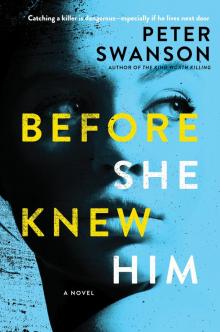 Before She Knew Him
Before She Knew Him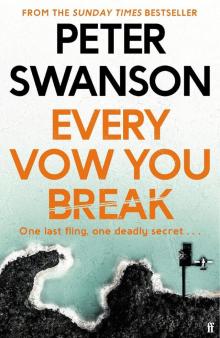 Every Vow You Break
Every Vow You Break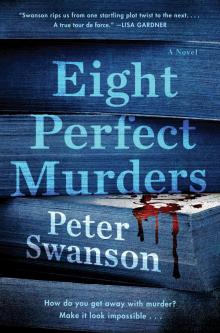 Eight Perfect Murders
Eight Perfect Murders Rules for Perfect Murders
Rules for Perfect Murders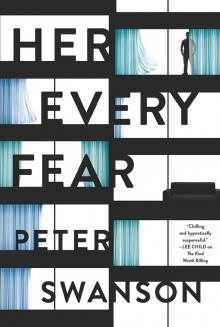 Her Every Fear
Her Every Fear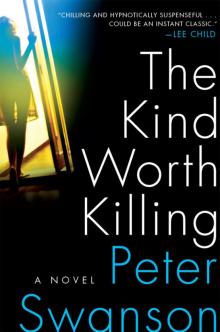 The Kind Worth Killing
The Kind Worth Killing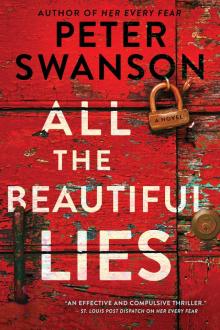 All the Beautiful Lies
All the Beautiful Lies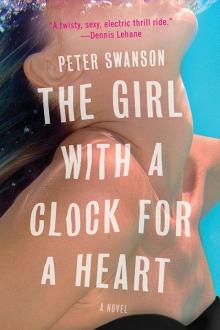 The Girl with a Clock for a Heart: A Novel
The Girl with a Clock for a Heart: A Novel